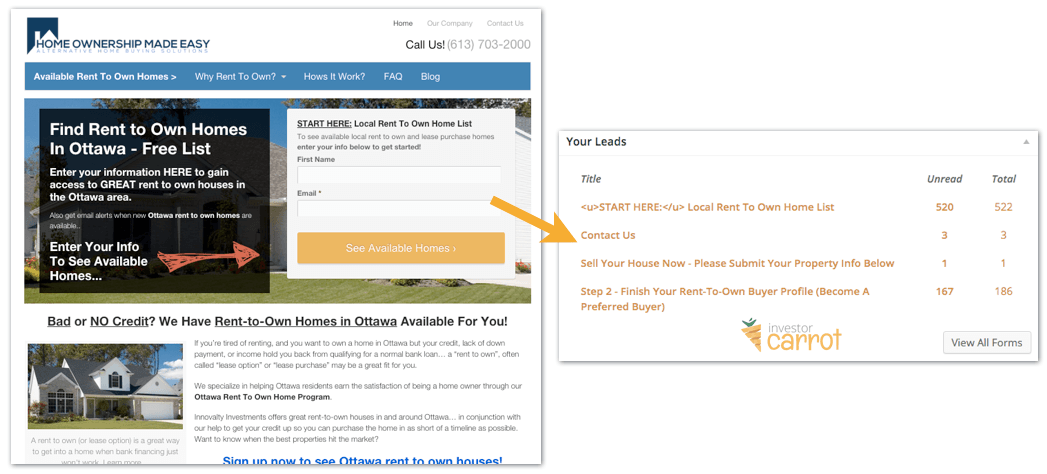Launching a PPC (PayPerClick) campaign can be one of the quickest ways to get your real estate investor website or agent website in front of your ideal prospects. If you haven’t checked out this case study call I did with an investor in Cincinnati recently on his big time return on investment with PPC… you should, it’s posted over on our sister company Carrot’s blog.
But, getting a good return on investment is a lot more than just launching a PPC campaign for motivated house sellers, tenants, or buyers and walking away.
In fact, I’d venture to say that simply launching a campaign, no matter how well it’s setup, and walking away can be an almost guaranteed path to a money suck in your business and your bottom line.
So, in this post we’ll dive into some tips on how to optimize your Google PPC Marketing campaigns as a real estate investor or agent so your PayPerClick campaigns continually give you a higher return on investment over time.
But first…
Should You Outsource Your Google PPC Marketing Or Do It Yourself?
We chatted with a client last week who followed a very good PPC marketing training by a very experienced and legit real estate investor to launch his own PPC campaign… and before he knew it he had spent $1,300 in just 4 days on Google PPC ads with nothing much to show for it because his campaign was launched, but not optimized well out of the gate and he didn’t keep a close eye on it over a long holiday weekend.
Just like that… $1,300 into Google’s coffers in 4 days.
The Managed PPC service in our Carrot Marketplace runs about $350/mo + ad costs… and in this one example, that would have saved this Carrot client hundreds and hundreds of dollars and hours of his time and pulled a higher long-term return on investment.
So, choose wisely because doing your own PPC marketing as an investor or agent does take time, effort, and continual work to be effective. If you don’t have the time or patience but want the result, find a reputable PPC management firm that specializes in real estate.
Ok, if you’ve decided to do your own PPC, congrats!
Let’s dive in and help you optimize your PPC campaigns and pull more profits from the web.
The Benefits Of PPC Marketing For Real Estate Investors And Agents – Why Should You Do It???
PayPerClick marketing is one of the first things we do when we’re going into a new market to generate motivated seller, rent to own tenant buyer, or cash buyer leads.
Why?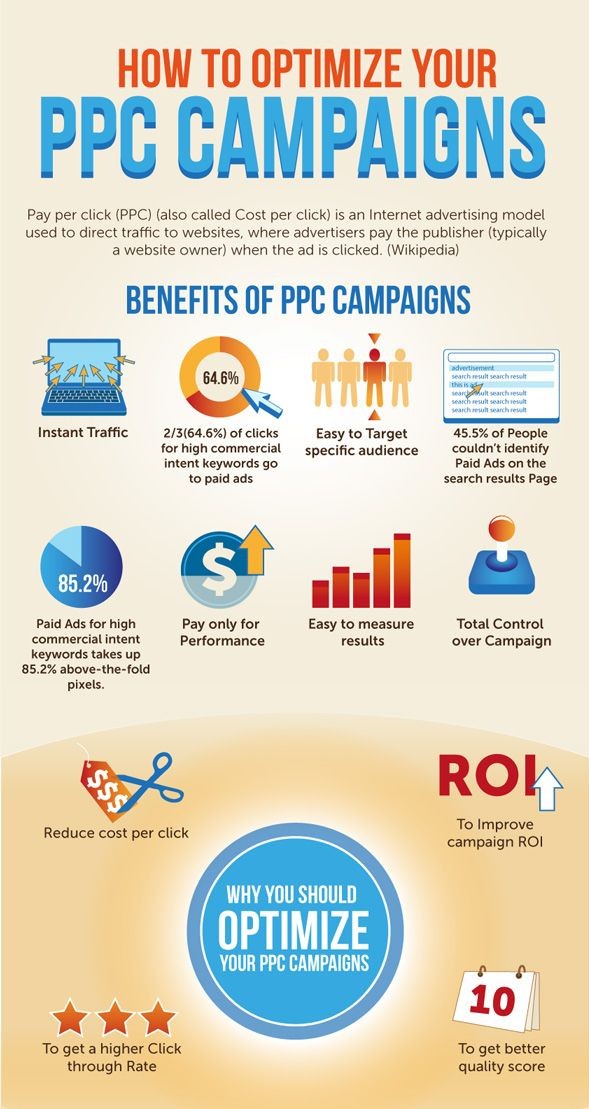
Because like the graphic above shows…
- Instant Traffic: With Google PPC marketing you can have traffic and hopefully leads coming in quickly. Usually within 72 hours of launching a well structured PPC campaign.
- Easy To Target A Specific Prospect: One of the best ways to know that you’re targeting the right person is by getting your website in front of the people who are actively looking for solutions to their problems on Google. “sell my house fast in Atlanta” as an example. That person of course needs to sell fast… that’s a targeted prospect.
- You Only Pay When Someone Clicks Your Ad: Google calls this “pay for performance”. With direct mail, you fork out the money upfront to pay the printing fees and postage with no guarantee that your target prospect will even engage or read your direct mail piece. With PPC marketing you only pay when someone clicks your ad and goes to your website.
- Get Traffic Coming In While You Build Out Your SEO: SEO can take a while to rank well in Google for competitive phrases. So while you’re building up your SEO… you can get traffic and leads coming in today with PPC.
- Easy To Measure: If you set your account and campaigns up correctly it’s pretty darn easy to measure what’s working and what’s not.
So we know that PPC marketing can be really effective for real estate investors and agents… but you may be asking… “How hard can it really be to optimize it? And why the heck do I have to optimize stuff after I get my campaign setup?”.
Well… if you’re not tweaking and refining your Google PPC campaigns to cut out the keywords that aren’t turning into leads and continually optimizing to increase your return on investment… you may as well light your money on fire because a non-optimized PPC campaign is basically doing just that.
So lets dive in and optimize that PPC marketing campaign.
20 Steps To Optimize Your Real Estate Investing PPC Campaigns
Ok, this is where the nuts and bolts comes in.
Of course we don’t have enough space on this blog post to dive into detail about each of the 20 PPC optimization steps, so this post will be focused on showing you what those steps are. We’ll do followup posts here on our blog that dive into more detail on the most important steps… so keep an eye out on our blog and in your email box for more awesome training.
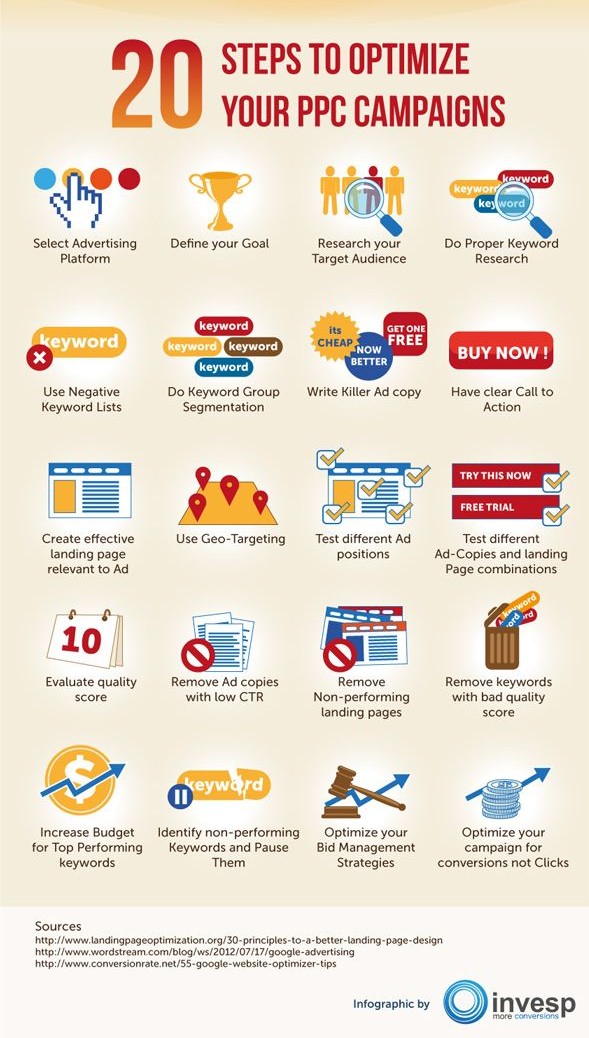
1. Select Your Advertising Platform:
Of course, before you can start doing PPC marketing you need to decide what platforms you’ll use. We always suggest starting with Google Adwords because well over 90%+ of all real estate investing leads we pull in through PPC is through Adwords. The rest is through Yahoo and Bing PPC. So, dive in and start with Google Adwords! Then add on Bing and Yahoo Search Marketing as you go.
2. Define Your Goal:
The biggest mistake investors and agents make when they start their PPC marketing campaigns is… they just start. They launch a campaign but don’t define any real clear goals for what they’re trying to achieve. “Get more leads” isn’t a goal. Make your PPC marketing goals clear and simple. “To generate motivated seller leads at under $60 per lead”. That’ll give you a good goal to shoot for so you know whether your campaign is even successful.
A good goal to start with is defining the cost per lead you’re aiming for and the return on investment you want to get over the long-term.
For most investors a cost per lead of under $90 is solid.
The further below that the better. And as for return on investment… maybe a good one to start is to close your first deal from your PPC seller leads within the first 3-4 months… then ramp it up from there.
You just have to remember that most PPC marketing campaigns don’t start off profitable. It’s the optimization process that makes your PPC campaign profitable as you go… and that can take 1-3 months to really hone down a campaign… and ongoing work from there to keep that consistent. As long as you can make it through the initial optimization phase (the first 1-3 months) your PPC marketing should be really profitable for you over the long run.
3. Research Your Target Audience:
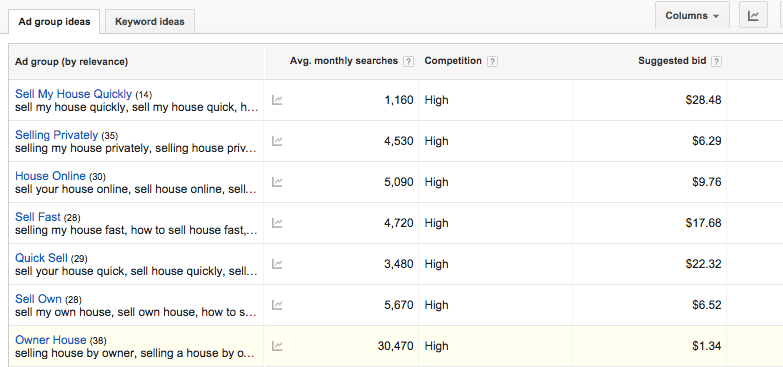
Use the Google Keyword Planner to help you discover what your target audience is typing into Google. It’s crazy the insights you can get in there for how your prospects think and how they search for solutions to their problem. Then serve up ads in front of the keywords that you can help them the most.
Before you launch ads, know who your target audience is.
What problems or needs do they have? What are they searching in Google? What solution are they looking for? What words do they use in their searches? Take all of this info and use it to help build out your keyword lists, ads, and landing pages.
4. Do Proper Keyword Research:
Doing your Keyword Research is one of the most important parts of your PPC campaign.
But use tools like Google Suggest, the Google Keyword Planner, Term Explorer, etc.
Here’s a really good free guide online on Keyword Research that’ll give you a really good start.
A big mistake that we see real estate investors make with their PPC keyword research is they aren’t looking at the intent of the searcher close enough.
Take for example if a seller types in the search phrase “House buyers in Dallas“.
Many people would look at that assume that the person is looking for a company to buy their house. One of those “house buyer” companies. But… what if they’re actually searching for retail house buyers in the Dallas area? If you’re a wholesaler or flipper and you have an ad up for that keyword and the house seller clicks on your ad… they may quickly realize that you can’t help them. Those types of keywords where there is what I call “fuzzy intent” can end up costing you a lot of money. So just make sure the intent of your keywords really focuses as much as possible at the start on the exact people you can help.
This will help you avoid wasting money at the start.
5. Use Negative Keyword Lists:
A “negative keyword” is a word that you can tell Google Adwords to look for… that if it shows up in a Google search… to prevent your ad from showing up to that person in that search.
As an example, let’s say you’re a wholesaler or house flipper and you of course need to buy at a discount. So you may want to add a negative keyword for something like “full retail” in there to prevent any searches that have “full retail” or “full price” in them from showing your ad.
Why? Because this type of person likely isn’t going to sell at a discount. So if someone types in “sell my house in dallas at full price” then your ad wouldn’t show up.
This can keep you from paying for clicks on your ads where the prospects wouldn’t be your ideal client.
6. Do Keyword Group Segmentation:
A big mistake most people new to Google Adwords is they throw all of their keywords into one “Ad Group” in their adwords account.
Heck, I did when I launched my first PPC marketing campaign.
But a really effective way to optimize your ad spend and drive down your cost per lead (also, to better target your ads to specific targets) is create separate keyword ad groups in your Google Adwords account.
Notice We Have Ad Groups Setup For Different Types Of Keyword In This Campaign
Then within each ad group is a whole slew of keyword variations, ads, etc.
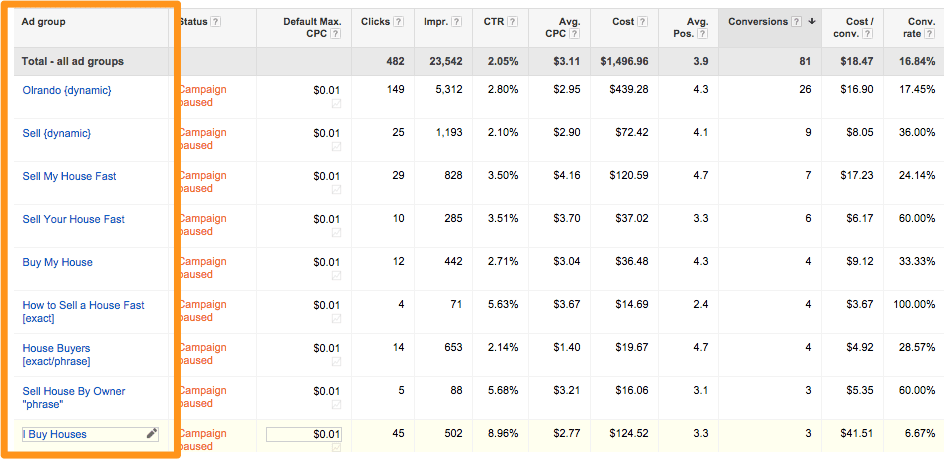
As another example, if you are running ads for motivated house sellers in 10 different cities… create a different keyword group for each location so you can really target those ads for that specific location. An ad targeted for that area coupled with a landing page specific to that area.
This will help the house seller really feel like you’re a local solution and specialize in that area.
But you can also do the same thing with different types of sellers.
Sellers in divorce, in foreclosure, relocating, probate, etc. Build separate keyword groups for each of these and really target in your ad copy and landing pages for those specific people.
7. Write Killer Ad Copy:
Lot’s of people say that phonebook advertising is dead. It definitely will be extinct someday, but people have been saying that phonebook advertising doesn’t work for years and years. (even back when people used phonebooks ;-).
The reason is because local company after local company would say… “Hey, I need a phonebook ad”.
Then they’d look through the phone book and see what their competitors ads looked like… they’d mock up an ad similar to theirs (because that must be working, right?) and put it up there. Then they’d complain because they weren’t getting any calls from it.
But here’s the key, it wasn’t the phonebook that didn’t work… it was that their ad sucked.
It didn’t stand out from their competitors.
It didn’t give any real compelling reason why they should talk with them vs their competitors.
PayPerClick campaigns are the same.
You can’t just look at what your competitors in your market are doing with their PPC ads and copy them. Why? Because you’ll risk being like all of those companies over the years that fell prey to the “copy what my top competitors are doing” mindset that made everyones ads look the same.
Write ad copy that grabs your prospects attention.

Ads that stand out from the rest.
A few ways you can do that…
1. Make your ads sell the benefit that they’ll get by clicking that link vs. how cool you are.
Which ad below stands out? The “we buy houses” one focuses 100% on their company… not on how they can help the client. The client wants to know how you can help them now how cool you are. But look at the one on the top… I can quickly see how they can help me. Fast closing. No fees. Any condition.
PLUS they use the Google Adwords Ad Extensions to grab more space on the page to get me to click the ad. Sold! I’m clicking that link!
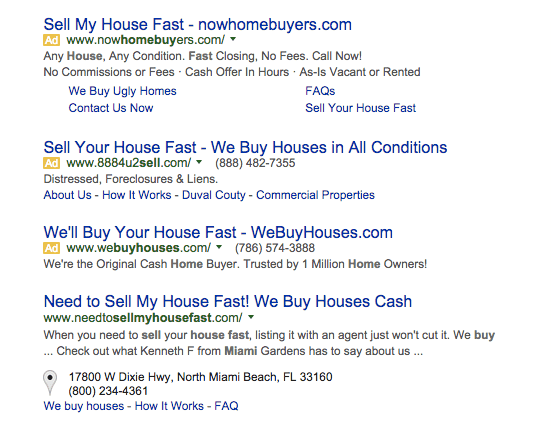
2. Use the Google Adwords Ad Extensions to grab more space on the page (they’re FREE).
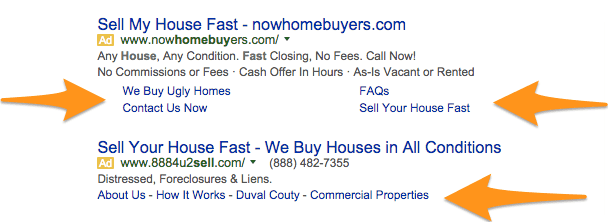
Google has this free thing they call “Ad Extensions”. This basically lets you ad little links below your main ad that link to other spots on your website. Like your “Fair Cash Offer” page or your “How It Works” page as an example.
Bit’s of content that your prospect would really value that will help them make their decision. These do help increase the number of clicks you’ll get… just make sure you’re sending them to pages on your website that are setup to convert them into a lead.
8. Have Clear Call To Action:
Let me ask you a question.
What’s the best way to make a sale?
Well… what I’ve found… the best way to make a sale is to clearly ask for the sale. That’s it.
Too many people try to dance around the subject and forget to clearly and confidently give their prospects a call to action that gets them closer to making a sale.
Take these ads below as an example.
Which one lays out how they can help me and gives me the most clear call to action of the 3?
Sure as heck not the 3rd one (the one outlined in Orange). That ad is too darn easy to just look past.
But the first one does a great job. It is very clear (even has a specific price point), lays out the benefits, and says they have an exclusive rent to own listing. Cool… I’ll check that one out!
TIP: Their call to action could be stronger by changing their “Sign Up Today” link to something like… “See Available RTO Homes” as our testing has shown works on our websites.
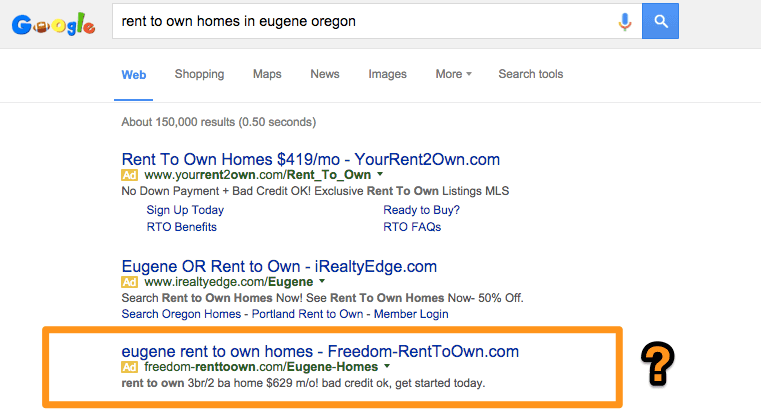
9. Create Effective Landing Pages:
All of the amazing high-quality motivated sellers or buyers from your PPC campaign won’t do you a lick of good without a landing page (or website) that performs well. You can see our conversion rate test blog posts we put out all of the time where we show our members’ websites pulling in sometimes 20%+ more leads just with tweaks we make to their websites.
This Carrot Client Has Driven Over 500 Rent To Own Leads Through PPC In Under 2 Months Because Of A High Converting Landing Page
So don’t waste your traffic sending it to a low-performing website. Start doing conversion tests today (or have us take that off your hands by joining Carrot on our Content Pro plan :-).
10. Use Geo-Targeting:
Geo-targeting your PPC marketing campaigns is a no brainer for real estate investors and agents mainly because real estate is such a geographically specific thing. If a person is looking for “rent to own homes in Ottowa canada“… odds are they’re in Ottowa or are of course at least looking for properties in Ottowa.
But not everyone uses the location in the actual search phrase. Some people may type “rent to own homes”… and Geo-Targeting is exactly how you get in front of those people in the areas you want to target.
This will help increase the click through rate (CTR) of your ads, increase the conversion rate on your landing page (if you send them to a city specific landing page), and help you cut down on wasted ad cost.
11. Test Different Ad Positions:
Most people think that the top ad in the Google search results is the best spot to be.
But this isn’t always the case.
Take a look at this graphic below.
Google PPC Click Through Rate By Ad Position
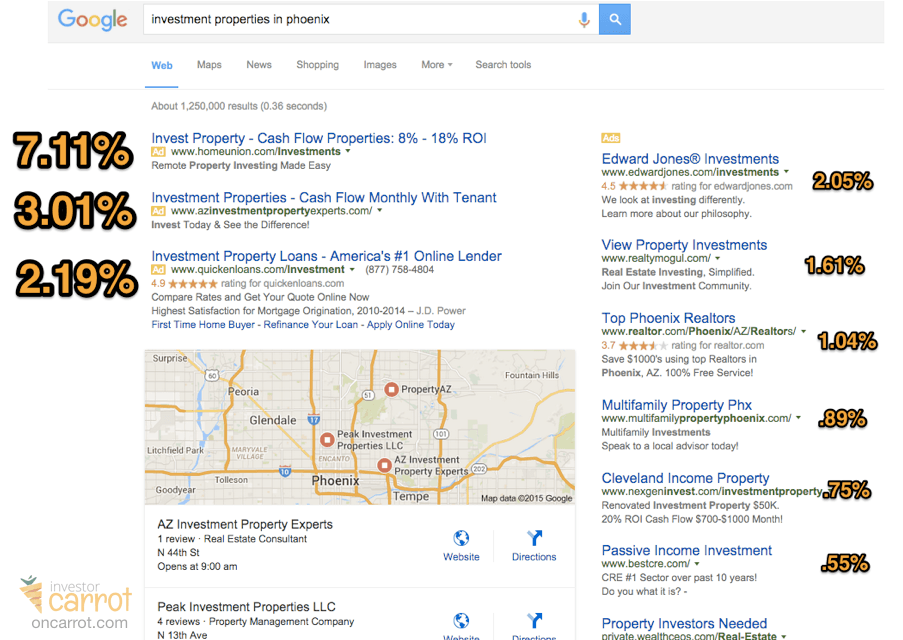
As you can see, the #1 ad does get the most clicks and it goes down from there, but that doesn’t tell the whole story.
Make sure to test what ad position is giving you the highest return on your investment… because it may cost you 3x+ to be in the first ad position versus the #4 position… but is the first ad position pulling you 3x the return on your investment as well?
Test things and see. If you aren’t patient enough to do this kind of optimization yourself… outsource your PPC. If you’re a Carrot member look in our Carrot Marketplace for our real estate investor specific PPC program that is crushing it for our members all across the country.
12. Test Different Ad Copy – Landing Page Combos:
Sometimes we find that one ad gets great clicks… but the landing page just doesn’t pull the opt ins as well as another. So make sure that once you find some ads that are pulling good clicks and they’re from highly targeted keywords that your prospect would type in… start to test other landing pages to see if you can mix and match to find the best performing combo.
13. Evaluate Quality Score:
Google Adwords has this thing they call the “Quality Score“. There are actually all kinds of quality scores that Google looks at.
All the way from an account wide Quality Score that Google uses behind the scenes… to Quality Score for your landing pages, ads, and so on.
The ones that are the easiest to control on your end is the Quality Score on your landing pages, ads, and campaigns.
On your landing pages Google looks for “relevant and original content, transparency, and navigability.”
In other words… look like a real company with real people behind it that care… and make your website easy for people to get the information they need from it.
Include things like a Terms of Service, Privacy Policy (which all Carrot sites have by default) and content that matches the promise that your ad lays out. Always try to improve your Quality Score… as we’ve found that the Quality Score is directly tied to improving your click costs in many cases.
14. Remove Ads With Low CTR:
One of the ways that Google adjusts which ad will show up where in the ad positions on a Google search is the CTR… or click through rate.
Ad Rank = CPC bid × Quality Score.
If the ad in position #2 is getting a CTR of 7% and bidding $2 per click… and the #1 position ad is getting a 4% CTR and bidding $2.50… Google may actually show the ad that is bidding only $2 per click in the #1 position because of it’s higher engagement with the searcher as indicated by the CTR (click through rate). Google makes more money this way because more people are clicking on the ad, the user wins because the ad is more compelling, and you win because you’re paying a lower cost for the same clicks because of well performing ads.
In fact, if you have ads or landing pages with a low quality score, Google may prevent them from even having a chance to show in the results at all. That’s how important optimizing for quality score is.
So make sure to go through your account on a consistent basis and remove your ads that aren’t performing well… and launch new ads to try to improve your CTR each and every month. This will help you continually improve your click cost and hopefully result in more leads at a lower cost.
Most leads at a lower cost is a good thing 🙂
15. Remove Non-Performing Landing Pages:
Same thing as above… stuff that isn’t performing well… give it the ol’ “heave ho!”.
Remove landing pages that aren’t performing as well as your clear “winner” and launch new pages on a continual basis or launch split tests of your current page to always drive the conversion rate up.
Landing pages and ads that aren’t performing well can drain your bank account and inflate your ad cost in a big way… so don’t overlook these optimization steps if you’re doing your own PPC marketing.
16. Remove Keywords With Bad Quality Score:
Not to pile on the Quality Score bandwagon we started a few “tips” ago… well, actually yes… let’s pile on.
Quality Score is critically important to the health of your Google Adwords marketing campaign as a real estate investor or real estate agent.
So make sure that any keywords with a bad Quality Score are removed so they don’t pull down the overall QS of your ad groups and campaigns.
17. Increase Budget For Top Performing Keywords:
Once you’ve had a chance to make sure your Quality Score is solid and you’ve removed your non-performing keywords and landing pages… find the ads and keywords that are performing well (performance should be decided upon ONLY by the conversion of quality leads on your website or phone calls from those visitors… NOT by clicks), increase the budget on the keywords that are performing well.
As you can see in this screenshot from one of my Google Adwords accounts… after a little while optimizing this campaign… we found some winners then promptly increased our bids to get more clicks and convert more leads.
What Happens When You Focus Your PPC Dollars On The Ads And Landing Pages That Are Converting Leads
This client went from struggling to get leads in his market to closing several deals from this campaign alone within the first $1,500 in ad spend. But it didn’t happen immediately… in fact it took a few months to hone things in. But it was well worth it for the client.
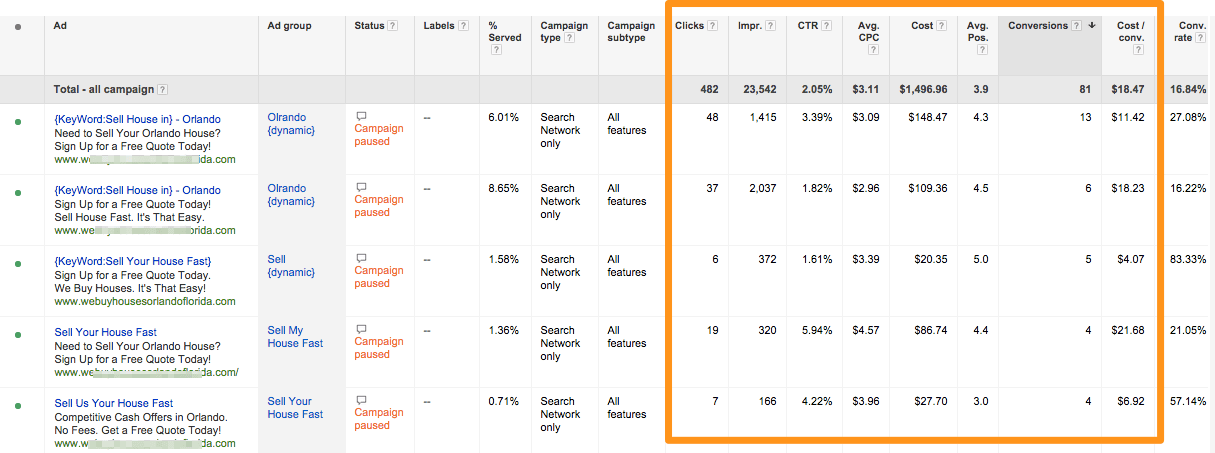
Some people may be thinking… “Well, what should I bump my max daily budget up to and my click bid up to?”
Really, as much as you can pay to still bring the results you want to bring.
One of the quickest ways to increase your lead flow on a campaign that is already pulling some leads is to increase your daily ad spend. Then if you’ve maxed out the amount of clicks you can get on that daily ad spend with that bid price… bump those bids up and test to see if the results still hold strong with a higher per click bid price.
This is why it’s important to never “set it and forget it” with your Google Adwords campaigns while you’re in the optimization phase.
18. Identify Non-Perming Keywords and Pause Them:
Then work through the campaign and find the keywords that aren’t performing well and pause them.
A Small Percentage Of Your Keywords Make Up The Most Ad Waste
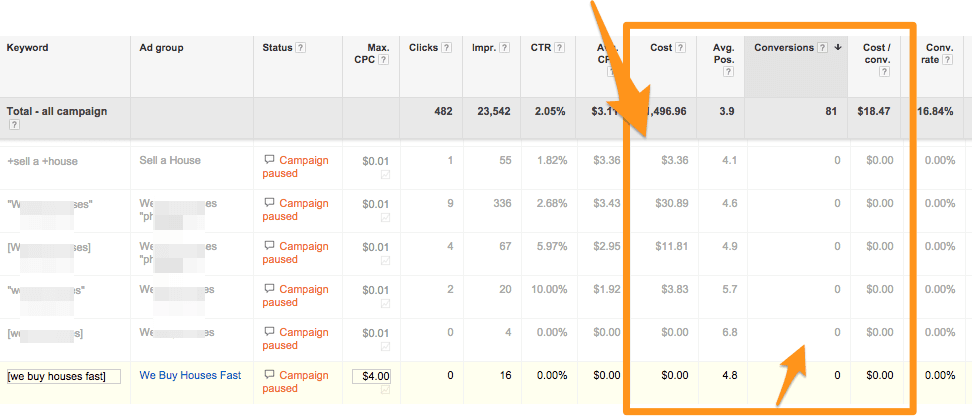
Really, since real estate is such a high profit margin product… 1 closed deal can flip an entire Google PPC campaign around to be from in the hole $1,500 to a $10k profit. So don’t quit too early or count certain keywords out too early.
But if you keep seeing a bunch of money being dumped into a keyword and it’s not converting into leads like it should… put a pause to those once you’re confident they’re not going to be good keywords for your campaign to focus on.
This is the #1 way that most do it yourselfers that we see doing their own PPC marketing can save a lot of money and headache… and sometimes cut their ad cost in half… is simply by getting rid of the keywords that just aren’t performing.
19. Optimize Your Bid Management Strategies:
As SearchEngineLand says, there are really 4 main goals that advertisers may have with their bid management strategy:
- Increase branding by driving lots of impressions while staying under a target CPM.
- Increase site traffic by driving lots of clicks while staying under a target CPC.
- Increase leads by driving conversions while staying below a maximum CPA.
- Increase sales by driving conversions with a positive ROI.
That’s a lot of acronyms eh?
Just as a refresher, “CPM” = Cost Per Thousand Impressions, “CPC” = Cost Per Click, “CPA” = Cost Per Action (i.e. – generating a lead), and “ROI” = Return On Investment.
For real estate investors we usually like to focus on staying below a maximum CPA… or in our world… staying below a maximum cost per lead.
This goes all of the way back to the start of this guide where we told you to determine your goal.
Once you do, that’ll help you determine your bid management strategy.
If your goal is to get as many quality leads as you can for below $75 per motivated seller lead… excellent! You’ll want to move your per click bid price around and your daily budget (assuming you have a high Quality Score on your ads, pages, etc.) until you hit that goal.
This post isn’t about the Google Adwords bidding management strategies that’ll help you save time, save money, and drive the leads you need at the cost you need… so look out for more on that in the future.
Or, do what you do best… and outsource your PPC to us in our Carrot Marketplace.
20. Optimize Your Campaign For Conversions NOT Clicks:
Easily 8 out of 10 real estate investors and agents I talk to who are doing their own Google PPC go silent when we’re on the phone and I ask them if they have conversion tracking on the campaign.
Conversion tracking is a simple thing you enable on your Adwords campaigns by getting a little piece of code from your Adwords account (here’s how) and putting it on your “conversion page”. Your conversion page is the page your visitors will see after they opt into your form.
For example, on InvestorCarrot, we have our streamlined “2 Step Lead Qualification Process“… so we make it easy for our users to put the conversion code on those “Step 2″ pages. It takes about 15 seconds in InvestorCarrot.
Even with our built in LeadSource Tracking feature (where our system will tell you if your leads came from Google SEO, Google PPC, Facebook, etc… so you know what marketing is working) you can’t tell which keywords and specific ads inside your Adwords account produced those leads without setting up conversion tracking in your Adwords account.
Why Conversion Tracking Is So Important. You Can See What’s Converting Leads
![]()
Many investors will just say “I’m getting leads, so it must be working”.
But what if you knew exactly which keywords and ads were the ones pulling the leads and which ones were the ones just costing you money? You could possibly drastically reduce your cost per lead just by turning off the keywords just costing you money but converting no leads.
Ready To Get To Work And Drive Those Leads With Google PPC!?
Google Adwords PPC marketing can be one of the most effective and fast ways to get your website in front of motivated sellers, cash buyers, tenants, rent to own tenants… and anyone else you’re wanting to reach.
But, it can take work, time, and experience to really crush it with Google PPC marketing.
As the great Google Adwords expert Perry Marshall says…
“Make sure you know what you’re doing before you begin, or you’ll lose your ass. “
The real estate investors and agents you see doing consistently well with PPC marketing aren’t just throwing ads up there and hoping for the best. They’re not even just throwing ads up there and checking it here and there.
They follow these steps above (or as many of them as they can) to really hone their PPC marketing campaigns to drive the most high-quality leads at the lowest cost per lead possible.
To put this all into perspective for you… the average wholesale deal right now nets $10,000 in assignment fees and the average flip profit currently nets $70,697 according to RealtyTrac… so if you’re going to give this a “try” with a few hundred bucks or even $1,000, save your money and don’t start.
Be ready to spend some time learning the Google Adwords platform…
… spending some good time in there optimizing things for the first several months, and be ready to invest at least $1,500 as a minimum before you decide if PPC marketing worked for you or not.
Recently a member who is doing very well with PPC for motivated sellers using our website system said that he didn’t close a deal until he’d already spent $1,500 in ads. Then he closed a deal that netted him $18,000. So if he would have quit after he’d had a month or two under his belt and $1,000 in ads spent… he would have missed out on that $18,000 profit deal.
So dive in, get to optimizing, and let us know how things goes!



